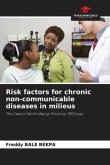Introduction: Infectious diarrhea is a significant cause of morbidity and mortality worldwide, especially in low-income countries.Methodology: A sample of 268 patients was randomly selected to represent the population attended at the hospital. Demographic variables, access to drinking water, area of residence, eating habits and hygiene practices were evaluated. Statistical tests, such as Pearson's Chi-Square, were used to analyze the relationship between these variables.Conclusions: A high prevalence of bacterial diarrhea was identified in the sample, highlighting the importance of access to drinking water in the prevention of these diseases. Personal hygiene practices and area of residence also influence the incidence of infectious diarrhea. These findings highlight the need for specific interventions to improve access to safe drinking water and promote proper hygiene practices to reduce the burden of disease in the community served by the hospital.
Bitte wählen Sie Ihr Anliegen aus.
Rechnungen
Retourenschein anfordern
Bestellstatus
Storno








